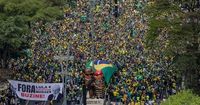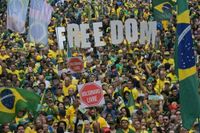On September 7, 2025, Brazil’s Independence Day, the nation’s streets pulsed with political fervor as tens of thousands of demonstrators rallied in cities from Brasília to Rio de Janeiro and São Paulo. The catalyst? The looming Supreme Court verdict on former president Jair Bolsonaro’s alleged attempt to overturn the 2022 election—a case that has not only divided Brazil but also drawn international attention, most notably from former U.S. President Donald Trump.
The day unfolded with dueling protests, each side reflecting the deep polarization that has come to define Brazil’s political landscape. On one side, Bolsonaro’s supporters—many dressed in the vibrant green and yellow of the national flag, some even waving American flags—flooded the iconic Avenida Paulista in São Paulo. According to aerial images cited by The New York Times, these right-wing demonstrators significantly outnumbered their left-wing counterparts, underscoring the former president’s enduring influence despite his current legal woes.
Bolsonaro himself, a 70-year-old former army captain who served as president from 2019 to 2022, was absent from the festivities. Under house arrest since August, he watched as his supporters called for amnesty, not just for him, but for the hundreds convicted after the January 8, 2023, storming of Brazil’s Supreme Court, presidential palace, and Congress. The demonstrators’ message was clear: they view Bolsonaro’s prosecution as political persecution. As one retiree, Aparecida Paula, told Agence France-Presse, “We are here to defend the rule of law and values in this country. Bolsonaro’s trial is a disgrace.”
Organized under the banner “Brazil Reacts,” the rallies featured speeches from prominent right-wing figures, including ultra-conservative evangelical pastor Silas Malafaia and several presidential hopefuls. São Paulo Governor Tarcisio de Freitas, a key advocate for amnesty and widely regarded as Bolsonaro’s potential successor, was among those present. Vendors hawked skewered meat, popcorn, and beer, creating a mood that was both festive and charged with anger toward the Supreme Court. Many protesters carried signs supporting Bolsonaro and denouncing President Luiz Inácio Lula da Silva, as well as the justices overseeing the trial. Some even displayed messages of gratitude to Trump, with shirts and banners bearing his image and the word “Magnitsky”—a nod to the U.S. law used to sanction the Brazilian Supreme Court justice leading the case.
Meanwhile, left-wing groups, trade unions, and social movements staged their own counter-protests. Their message was unequivocal: “No amnesty.” They called for Bolsonaro’s imprisonment and condemned Trump’s attempts to intervene in Brazil’s judicial process. Ana Baldas, a retired psychoanalyst attending a rally in downtown Rio de Janeiro, expressed her frustration with the former U.S. president’s involvement: “It’s absurd. He can’t dictate what we do in our country.”
At the heart of the debate is the fate of hundreds of Bolsonaro supporters already serving sentences for the January 2023 attack, which sought to spur a military takeover just a week after Lula’s return to power. Bolsonaro, who was in the United States at the time, is accused of inciting the rioters. If convicted, he faces up to 43 years in prison—a prospect that has galvanized both his base and his opponents. The prospect of amnesty, whether for the rioters or Bolsonaro himself, has become a flashpoint. Party leaders and members of Congress are actively negotiating potential legislation that could keep Bolsonaro out of prison, though it would likely bar him from running for office again. As Chamber of Deputies President Hugo Motta told AFP, “there is still no decision” on amnesty, but negotiations have intensified in recent days.
President Lula, who led the traditional Independence Day parade in Brasília under the motto “Sovereign Brazil,” has been firm in his opposition to amnesty for those involved in the January 2023 unrest. With 2,000 officers deployed and additional troops on standby, the parade was a show of both national pride and heightened security. Lula, 79, who plans to seek reelection in 2026, used his platform to send a pointed message to Trump and the international community: “We are not, and will never again be, anyone’s colony. We do not accept orders from anyone.” In a televised address, he warned, “It’s a battle that must also be fought by the people,” emphasizing the risks of granting amnesty to those who, in his view, threatened Brazil’s democracy.
The international dimension of the crisis cannot be ignored. Trump’s imposition of 50 percent tariffs on Brazilian imports and sanctions against the Supreme Court justice overseeing Bolsonaro’s case have only fueled the sense of external interference. While Trump’s actions have energized Bolsonaro’s supporters—one protester in Brasília even posed for photos in a Trump mask—they have also bolstered Lula’s standing among his own base and the broader public. According to The New York Times, Trump’s efforts “have so far only strengthened support for President Luiz Inácio Lula da Silva, Mr. Bolsonaro’s leftist rival, while the court has pushed ahead with the trial.”
For many on the right, the hope is that Congress will ultimately grant amnesty, sparing Bolsonaro from prison. Sheila Santos, a retired police officer at a protest in Brasília, voiced the prevailing sentiment among Bolsonaro’s faithful: “Unfortunately, we know he will be unfairly convicted. This is our hope now.” Yet, the legacy of past amnesties—particularly those granted to military officials for crimes during Brazil’s 1964-1985 dictatorship—looms large, making the issue especially contentious. Some on the left, like Baldas, fear that even if Congress passes an amnesty law, it could be undone by a presidential veto or a court challenge. “We’ll end up with Bolsonaro being in prison anyway, and things will calm down,” she said. “At least that’s my most optimistic hope.”
Bolsonaro, barred from running for office until 2030 for casting doubt on Brazil’s voting system without evidence, maintains his innocence and insists he is the target of a political witch hunt. As the Supreme Court prepares to deliver its verdict, the stakes for Brazil’s democracy could hardly be higher. The outcome will not only determine the fate of a former president but could also set the tone for the nation’s political future—one where questions of justice, accountability, and sovereignty continue to spark fierce debate both at home and abroad.
As Brazil awaits the court’s decision, the events of Independence Day have made one thing clear: the country’s divisions run deep, and the struggle over its democratic institutions is far from resolved.



